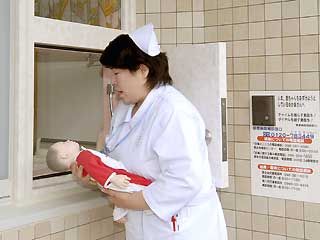
Adoption
Anonymous Baby ‘Drop Boxes’: Under Criticism by the United N
The latest adoption scandal is the use of “baby boxes” throughout Europe
Posted June 13, 2012

The latest adoption scandal, according to many recent news reports, is the use of “baby boxes” throughout Europe. The growing number of baby boxes, which are “hatches for unwanted newborns”, throughout Europe, has attracted criticism from the United Nations, which states that the boxes violate a child’s rights to know their biological parents.
To further elaborate: baby boxes are heated incubators that are frequently found built into the walls of hospitals, and are meant to “provide a safe place to leave children who are not wanted by their parents.” To understand how this works, consider this excerpt from a Guardian article (June 12, 2012):
On Saturday evening the bell of the "baby box" in Budapest's Heim Pál children’s hospital rang at the intensive care department, signaling that a newborn had been placed in the heated incubator.
It was the fourth time this year that somebody left a baby in the hatch in the garden wall of the hospital—a higher rate than usual.
"We saw on our monitors that a baby was placed in the incubator just about the time the bell was pushed," said Emoke Székely, head physician of the department. "However, we saw nothing more than the baby suddenly appearing in the box. Our cameras are placed in a way to not release any information about the persons using this opportunity. This is the point of this whole facility, to secure full anonymity. In a way it is similar to the practices from previous centuries, when foundling babies were left on church stairs."
Proponents of these boxes argue they save lives. Correspondingly, the boxes have grown in popularity in recent years, becoming more common in a variety of European countries such as the Czech Republic, Germany, and Latvia. Since 2000, over 400 children have been left in the 200 boxes throughout Europe.
Yet whereas religious commentators often view these as a “preferable solution to abortion,” and proponents of the boxes say that they result in fewer infant deaths, critics (including the UN Committee on the Rights of the Child) argue that the boxes contravene the state’s “duty to respect the child’s right to maintain personal relations with his or her parent,” violating the child’s right to a name and nationality in the process. The committee also argued that the boxes do not save lives.
For example, Maria Herczog, a sociologist and a member of the UN committee, told the Guardian: “Just like medieval times in many countries we see people claiming that baby boxes prevent infanticide there is no evidence for this.”
Herczog went on to argue that the boxes should be replaced with better provision for family planning to prevent unwanted pregnancies. She further asserted that the current situation in Hungary, in particular, is paradoxical, pointing out that “while midwife Ágnes Geréb is sent to jail for championing home birth under controlled circumstances, the incubator programme, though indirectly, sends out the mistaken message to pregnant women in crisis that they are right to continue with hiding their pregnancies, giving birth under uncontrolled circumstances, and then abandoning their babies anonymously, losing the possibility to connect with them again."
Herczog told the Guardian that she and many other experts had advocated a different system (one similar to the French system), one that would make anonymous childbirth at hospitals possible. Such a system, she contended, is ideal for mothers and children, in that it does not erase the possibility that they can receive information about each other later in their lives, if they wish.
Herczog further elaborated: "The baby hatch is an easy and comfortable 'solution' for the state, instead of providing a comprehensive set of policies, services to prevent abandonment. Currently the system is serving first and foremost the interest of the prospective adoptive parents, who are usually well situated middle-class families, while at the same time indirectly assumes that these birth mothers are irresponsible and unsuitable for motherhood."
Yet while Herczog’s message may be compelling—that baby boxes should be replaced by better state provision of family planning, counseling for women, and support for unplanned pregnancies—it is worth noting that baby boxes continue to be viewed as useful by the general public. A Swiss poll in 2011, for example, found 87% of individuals surveyed agreed that baby boxes were “very useful or useful,” and more than a quarter of respondents thought every hospital should have one.
It is interesting to note that Herczog suggested that the activities of Members of the European Parliament (MEP), who were behind the promotions of the baby boxes, were “taking their cues from the religious right in the US.” Ms. Herczog noted the MEP’s activities were “very similar to the United States, where we have the spread of the Safe Haven programme with baby boxes in 50 states since 1999.” Indeed, in the US, Safe Haven laws have been enacted in every state since 2008. Herczog and others have argued that the successful campaign to enact Safe Haven legislation was initiated and promoted by pro-life organizations and those on the “religious right.” Yet others—including some child advocates—view Safe Haven laws as important in that they may help to reduce the number of infant deaths due to abandonment. Although Safe Haven laws vary by state, under the Maryland law, for example, a parent can turn a baby over to a “responsible adult” within 10 days of birth and not face prosecution. Other states require the baby to be dropped off at a hospital, police station or firehouse.

